-
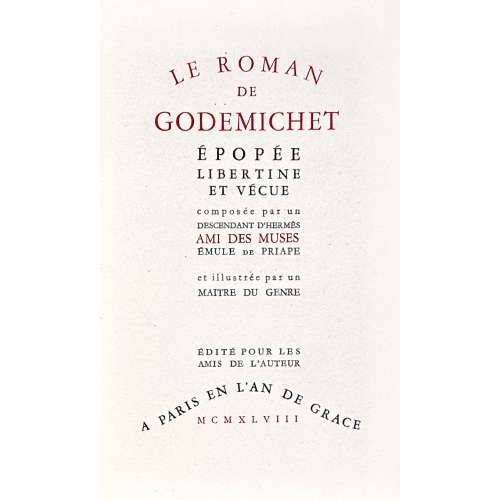 Softcover volume, 23.5 x 15 cm, in tan French flapped wrappers with red lettering to front, collated in-4to, in a tan double slipcase 24 x 15 cm with red lettered label to spine, pp.: [1-12] 13-112 [8], total 120 pages, incl. those within wrappers; printed on thick wove paper watermarked “Lafuma Frères”, 5 full-page and 6 half-page illustrations within collation, incl. frontispiece, guard tissue laid in. Title-page (red and black): LE ROMAN | DE | GODEMICHET | ÉPOPÉE | LIBERTINE | ET VÉCUE | composée par un | DESCENDANT D’HERMES | AMI DES MUSES | ÉMULE DE PRIAPE | et illustrée par un | MAITRE DU GENRE | ÉDITÉ POUR LES | AMIS DE L’AUTEUR | A PARIS EN L’AN DE GRACE | MCMXLVIII || Limited edition 200 + XX, this is copy № 175. Catalogue raisonné: Dutel III № 2336. Jean Reschofsky (French, 1905 – 1998) – artist.
Softcover volume, 23.5 x 15 cm, in tan French flapped wrappers with red lettering to front, collated in-4to, in a tan double slipcase 24 x 15 cm with red lettered label to spine, pp.: [1-12] 13-112 [8], total 120 pages, incl. those within wrappers; printed on thick wove paper watermarked “Lafuma Frères”, 5 full-page and 6 half-page illustrations within collation, incl. frontispiece, guard tissue laid in. Title-page (red and black): LE ROMAN | DE | GODEMICHET | ÉPOPÉE | LIBERTINE | ET VÉCUE | composée par un | DESCENDANT D’HERMES | AMI DES MUSES | ÉMULE DE PRIAPE | et illustrée par un | MAITRE DU GENRE | ÉDITÉ POUR LES | AMIS DE L’AUTEUR | A PARIS EN L’AN DE GRACE | MCMXLVIII || Limited edition 200 + XX, this is copy № 175. Catalogue raisonné: Dutel III № 2336. Jean Reschofsky (French, 1905 – 1998) – artist. -
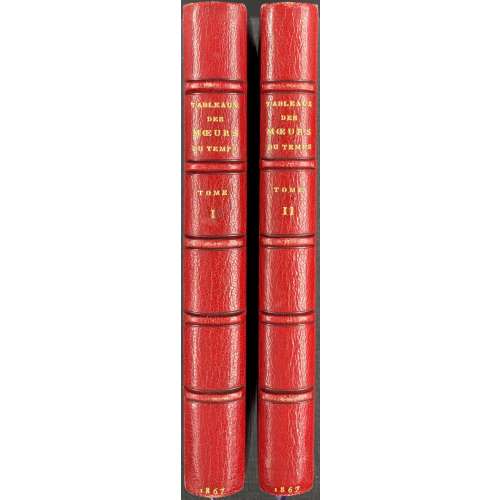 Two volumes in-12, 16.8 x 11.5 cm each, uniformly bound in ¾ red crushed morocco over marbled boards, spine with raised bands and gilt lettering, marbled endpapers, text printed on laid paper, 6 plates (3 in each vol.) on India paper pasted in on thick laid paper leaves. This edition seems similar to Nordmann I 203 but without Félicien Rops' frontispiece and plates, replaced by unsigned etchings attributed to Gustave Staal. Title-page (red and black): LE RICHE DE LA POPELINIÈRE | – | TABLEAUX | DES | MŒURS DU TEMPS | DANS LES DIFFÉRENTS AGES DE LA VIE | – | NOTICE DE | CHARLES MONSELET | – | TOME PREMIER (SECOND) | {fleuron} | PARIS | IMPRIMERIE DES CI-DEVANT FERMIERS GÉNÉRAUX | – | M D CCC L XVII || Vol. 1: π2 (h.t., t.p.) a4 (Notice), 1-1312 151 (Table); total 91 leaves plus three leaves of plates. Pagination: [4] [i] ii-vii [viii] [3] 4-168 [2]; total 182 pp, ils. facing pp. 59, 78, and 94. Vol. 2: π2 (h.t., t.p.), 1-1312, 152; total 88 leaves plus three leaves of plates. Pagination: [4] [1] 2-170 [2]; total 176 pp, ils. facing pp. 74, 78, and 145. Catalogue raisonné: Dutel I: A-1044 — without Félicien Rops ‘ornementations’, but with ‘6 gravures de 1865’. Dutel suggests that the edition was performed by A. Poulet-Malassis, Briard or Lécrivain. Catalogue Poulet-Malassis & ses amis description: № 43. LE RICHE DE LA POPELINIÈRE. Tableaux des mœurs du temps dans les diérents âges de la vie, tome premier (— second). Notice de M. Charles Monselet. Imprimerie des ci-devant fermiers généraux, Paris, M D CCC LXVII [A. Poulet-Malassis, 1867]. Exemplaire sans le frontispice de Félicien Rops mais bien complet des 6 figures de Staal, justification qui illustre les aléas de la confection des publications clandestines. D’une part, c’est une autre édition qui est décrite par Launay. L’exemplaire vendu chez Maître Loudmer avait 6 figures, comme ici. Cluzel a vu un “front. et 4 vignettes de Rops plus cinq figures libres (par Staal)”, Simonson a vu 5 figures de Rops, etc., etc. Il y a 3 bandeaux et 3 culs-de-lampe de Rops qui ont été fréquemment utilisés par d’autres éditeurs pour d’autres titres pendant toute la seconde moitié du xixe siècle. La Léonina présente une fiche détaillée sur 4 pages. 3 bandeaux et 3 culs-de-lampe gravés sur bois de Rops. Bibliographie : Pia 1389, Launay 327, Gay 6-308, Pey 122 (1800 frs avec 5 figures), PC 503 et 504, Lemonnyer 3-1173, LL 66, Leonina 81, Nordmann 1-203, Dutel A-1043. Contributors: Alexandre Jean Joseph Le Riche de La Popelinière (French, 1693 – 1762) – author. Charles Monselet (French, 1825 – 1888) – author (foreword). Pierre-Gustave-Eugène Staal (French, 1817 – 1882) – artist. Auguste Poulet-Malassis (French, 1825 – 1878) – publisher.
Two volumes in-12, 16.8 x 11.5 cm each, uniformly bound in ¾ red crushed morocco over marbled boards, spine with raised bands and gilt lettering, marbled endpapers, text printed on laid paper, 6 plates (3 in each vol.) on India paper pasted in on thick laid paper leaves. This edition seems similar to Nordmann I 203 but without Félicien Rops' frontispiece and plates, replaced by unsigned etchings attributed to Gustave Staal. Title-page (red and black): LE RICHE DE LA POPELINIÈRE | – | TABLEAUX | DES | MŒURS DU TEMPS | DANS LES DIFFÉRENTS AGES DE LA VIE | – | NOTICE DE | CHARLES MONSELET | – | TOME PREMIER (SECOND) | {fleuron} | PARIS | IMPRIMERIE DES CI-DEVANT FERMIERS GÉNÉRAUX | – | M D CCC L XVII || Vol. 1: π2 (h.t., t.p.) a4 (Notice), 1-1312 151 (Table); total 91 leaves plus three leaves of plates. Pagination: [4] [i] ii-vii [viii] [3] 4-168 [2]; total 182 pp, ils. facing pp. 59, 78, and 94. Vol. 2: π2 (h.t., t.p.), 1-1312, 152; total 88 leaves plus three leaves of plates. Pagination: [4] [1] 2-170 [2]; total 176 pp, ils. facing pp. 74, 78, and 145. Catalogue raisonné: Dutel I: A-1044 — without Félicien Rops ‘ornementations’, but with ‘6 gravures de 1865’. Dutel suggests that the edition was performed by A. Poulet-Malassis, Briard or Lécrivain. Catalogue Poulet-Malassis & ses amis description: № 43. LE RICHE DE LA POPELINIÈRE. Tableaux des mœurs du temps dans les diérents âges de la vie, tome premier (— second). Notice de M. Charles Monselet. Imprimerie des ci-devant fermiers généraux, Paris, M D CCC LXVII [A. Poulet-Malassis, 1867]. Exemplaire sans le frontispice de Félicien Rops mais bien complet des 6 figures de Staal, justification qui illustre les aléas de la confection des publications clandestines. D’une part, c’est une autre édition qui est décrite par Launay. L’exemplaire vendu chez Maître Loudmer avait 6 figures, comme ici. Cluzel a vu un “front. et 4 vignettes de Rops plus cinq figures libres (par Staal)”, Simonson a vu 5 figures de Rops, etc., etc. Il y a 3 bandeaux et 3 culs-de-lampe de Rops qui ont été fréquemment utilisés par d’autres éditeurs pour d’autres titres pendant toute la seconde moitié du xixe siècle. La Léonina présente une fiche détaillée sur 4 pages. 3 bandeaux et 3 culs-de-lampe gravés sur bois de Rops. Bibliographie : Pia 1389, Launay 327, Gay 6-308, Pey 122 (1800 frs avec 5 figures), PC 503 et 504, Lemonnyer 3-1173, LL 66, Leonina 81, Nordmann 1-203, Dutel A-1043. Contributors: Alexandre Jean Joseph Le Riche de La Popelinière (French, 1693 – 1762) – author. Charles Monselet (French, 1825 – 1888) – author (foreword). Pierre-Gustave-Eugène Staal (French, 1817 – 1882) – artist. Auguste Poulet-Malassis (French, 1825 – 1878) – publisher. -
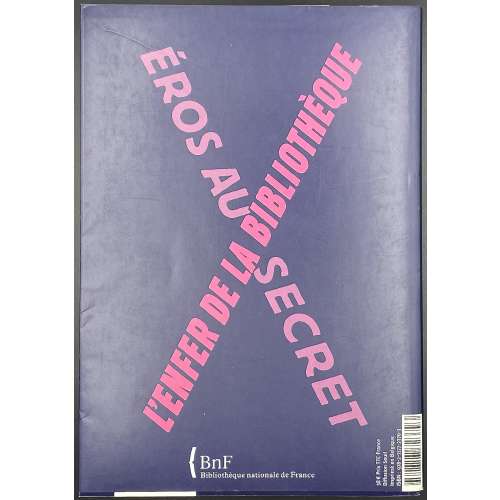 Exhibition held December 4, 2007, to March 2, 2008, at the Bibliothèque Nationale de France. Title: L'enfer de la Bibliothèque | ÉROS AU SECRET | Sous la direction | de Marie-Françoise Quignard | et Raymond-Josué Seckel | [spase] | {BnF | Bibliothèque nationale de France || Description: 23 x 16 cm, publisher’s lettered wrappers and pictorial dust jacket, [1-17] 18-460 [4], ils.; 257 entries, 8 pp. bibliography, 10 pp. index.
Exhibition held December 4, 2007, to March 2, 2008, at the Bibliothèque Nationale de France. Title: L'enfer de la Bibliothèque | ÉROS AU SECRET | Sous la direction | de Marie-Françoise Quignard | et Raymond-Josué Seckel | [spase] | {BnF | Bibliothèque nationale de France || Description: 23 x 16 cm, publisher’s lettered wrappers and pictorial dust jacket, [1-17] 18-460 [4], ils.; 257 entries, 8 pp. bibliography, 10 pp. index. -
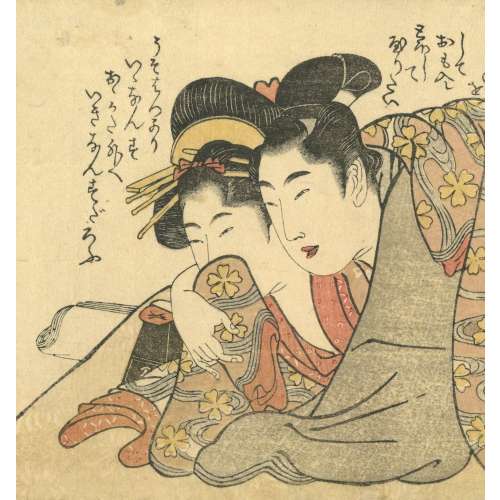 Artist: Kitagawa Utamaro [喜多川 歌麿] (Japanese, c. 1753 – 1806) "This uncommon half-size horizontal ōban ... is most likely one design from a set of twelve prints issued late in Utamaro's life" [Japanese Erotic Fantasies, Hotei Publishing, 2005, p. 143, pl. 47]. Half-size horizontal ōban must be 12.7 x 38 cm. Richard Waldman and Chris Uhlenbeck say it's tanzaku size (13 x 43 cm). In reality, the prints of this series measure 17 x 38 cm, which corresponds exactly to horizontal o-hosoban paper size. I managed to assemble 11 of allegedly 12 designs. 7 of them have genitals colored by hand. It's hard to tell whether it was done by the publisher on demand of a peculiar buyer, or by the owner of the prints who considered the black and white privy parts unnatural. My sequencing of the prints is arbitrary. Transcription of the text may help find the correct order.
Artist: Kitagawa Utamaro [喜多川 歌麿] (Japanese, c. 1753 – 1806) "This uncommon half-size horizontal ōban ... is most likely one design from a set of twelve prints issued late in Utamaro's life" [Japanese Erotic Fantasies, Hotei Publishing, 2005, p. 143, pl. 47]. Half-size horizontal ōban must be 12.7 x 38 cm. Richard Waldman and Chris Uhlenbeck say it's tanzaku size (13 x 43 cm). In reality, the prints of this series measure 17 x 38 cm, which corresponds exactly to horizontal o-hosoban paper size. I managed to assemble 11 of allegedly 12 designs. 7 of them have genitals colored by hand. It's hard to tell whether it was done by the publisher on demand of a peculiar buyer, or by the owner of the prints who considered the black and white privy parts unnatural. My sequencing of the prints is arbitrary. Transcription of the text may help find the correct order. As Japanese Erotic Fantasies put it: "a couple engaged in love-making, their stare fixed outside the picture plane". This is the only image of series that has a reference in available western literature, and the only one found in museum collections: Rijksmuseum Amsterdam (RP-P-1999-2001-16); reference: Fukuda (ed.) (1990), pls. 11-2.
As Japanese Erotic Fantasies put it: "a couple engaged in love-making, their stare fixed outside the picture plane". This is the only image of series that has a reference in available western literature, and the only one found in museum collections: Rijksmuseum Amsterdam (RP-P-1999-2001-16); reference: Fukuda (ed.) (1990), pls. 11-2.
 The scene of this print looks quite similar to that of the Kiyonaga's Sode no maki:
The scene of this print looks quite similar to that of the Kiyonaga's Sode no maki:
 The woman is "a young lady-in-waiting of Shogun's Court or Daimyō's Mansion, enjoying a rare outing from her tedious chores" [Richard Lane]. She is fully dressed in her outer cloak (shikake), white paper hat (agebōshi or tsunokakushi), and toed socks (tabi). A book or maybe, onkotogami (roll of tissues known as 'paper for honourable act' ) is still in the folds of her kimono. She is holding an open fan, either to cover her and her lover's faces from an unsolicited witness or to bring some fresh air to their joined lips. The pair just started their sexual intercourse.
The woman is "a young lady-in-waiting of Shogun's Court or Daimyō's Mansion, enjoying a rare outing from her tedious chores" [Richard Lane]. She is fully dressed in her outer cloak (shikake), white paper hat (agebōshi or tsunokakushi), and toed socks (tabi). A book or maybe, onkotogami (roll of tissues known as 'paper for honourable act' ) is still in the folds of her kimono. She is holding an open fan, either to cover her and her lover's faces from an unsolicited witness or to bring some fresh air to their joined lips. The pair just started their sexual intercourse.
 A scene from medieval times. A courtier in eboshi cap having sex with an aristocratic young woman with a long straight hairstyle (suihatsu).
A scene from medieval times. A courtier in eboshi cap having sex with an aristocratic young woman with a long straight hairstyle (suihatsu).
 Completely naked couple in the moment of ejaculation. Lavish garments with paulownia leaves on a yellow background counterbalance the white bodies on red bedding. The form of a woman's cheeks is telling, but I don't know about what. Maybe her advanced age?
Completely naked couple in the moment of ejaculation. Lavish garments with paulownia leaves on a yellow background counterbalance the white bodies on red bedding. The form of a woman's cheeks is telling, but I don't know about what. Maybe her advanced age?
 The pose of the couple and the overall composition are similar to that of the previous sheet. Though the lovers are dressed, and the woman's hairdo is well kept. The male looks older and the woman - younger.
The pose of the couple and the overall composition are similar to that of the previous sheet. Though the lovers are dressed, and the woman's hairdo is well kept. The male looks older and the woman - younger.
 A man takes a young maid from behind. She clenches the sleeve of her kimono in her teeth; it's either the moment of penetration (beginning of intercourse) or of her orgasm (the end of it).
A man takes a young maid from behind. She clenches the sleeve of her kimono in her teeth; it's either the moment of penetration (beginning of intercourse) or of her orgasm (the end of it).
 This seems to be a forced intercourse between a lackey with extensive bodily hair and a young maid from the same household.
This seems to be a forced intercourse between a lackey with extensive bodily hair and a young maid from the same household.
 This design is very much like the other one presented below, which is described at Japanese Erotic Fantasies on page 136 (pl. 43b) as follows: "The viewer peers through a mosquito net to see a child fast asleep, while his mother or wet-nurse moves towards her partner. On our print there is no child; instead of a sleeping baby, there is a roll of onkotogami. Fewer objects make the overall image concise, almost laconic in comparison with the Ehon hana fubuki (1802) design:
This design is very much like the other one presented below, which is described at Japanese Erotic Fantasies on page 136 (pl. 43b) as follows: "The viewer peers through a mosquito net to see a child fast asleep, while his mother or wet-nurse moves towards her partner. On our print there is no child; instead of a sleeping baby, there is a roll of onkotogami. Fewer objects make the overall image concise, almost laconic in comparison with the Ehon hana fubuki (1802) design:

 A young couple in a moment of true love. He is listening to the beating of her heart.
A young couple in a moment of true love. He is listening to the beating of her heart.
 This is a moment of true love between an old monk and a young samurai. The latter even did not take of his socks (tabi).
This is a moment of true love between an old monk and a young samurai. The latter even did not take of his socks (tabi).
 From Japanese Erotic Fantasies: "Boats played a crucial role in the workings of Yoshiwara, as they were the primary means of transport to the district. During the hot summer months, trips on pleasure boats were also a favourite pastime. Sex aboard a boat is a recurrent theme in shunga".
The last print that I am currently lacking and hunting for:
From Japanese Erotic Fantasies: "Boats played a crucial role in the workings of Yoshiwara, as they were the primary means of transport to the district. During the hot summer months, trips on pleasure boats were also a favourite pastime. Sex aboard a boat is a recurrent theme in shunga".
The last print that I am currently lacking and hunting for:
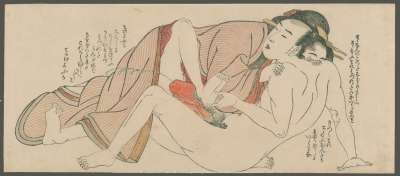 I know where it is, but I cannot reach it... yet.
I know where it is, but I cannot reach it... yet. -
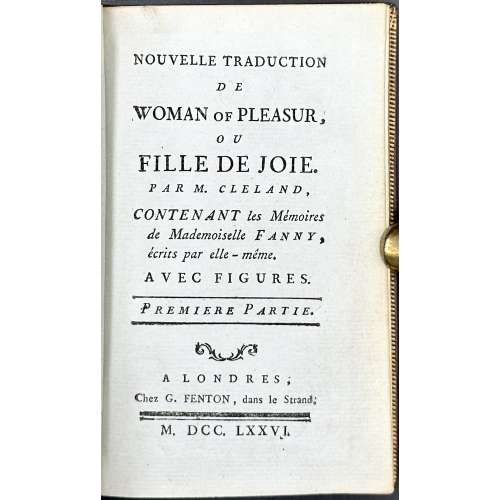 Hardcover volume, collated 18mo, 130 x 85 mm (2 parts in one). Contemporary burgundy morocco outlined with gilt triple fillet, flat spine gilt in compartments, brown morocco label gilt, all edges gilt, gilt dentelle, text printed on slightly blue laid paper with illegible watermark; dark blue endpapers, Tony Fekete (T. F.) bookplate by Wahorn to front pastedown. Frontispiece and 14 engraved plates by Elluin after Borel, with guard tissue. Graphite ms to h.t.: "Figures de Borrel. | Gravées pr. Elluin." Title-page: NOUVELLE TRADUCTION | DE | WOMAN OF PLEASUR, | OU | FILLE DE JOIE. | PAR M. CLELAND, | CONTENANT les Mémoires | de Mademoiselle FANNY, | écrits par elle – même. | AVEC FIGURES | — | PREMIERE (SECONDE) PARTIE. | — | ~ | A LONDRES; | Chez G. FENTON, dans le Strand; | — | M. DCC. LXXVI. || Collation: 18mo throughout A-O12/6, total 126 leaves plus 15 plates, incl. frontispiece. Pagination: separate for each part [1-5] 6-119 [120 blank], [1-3] 4-132, total 252 pages. Provenance: Tony Fekete (Christie’s 2014, № 54, p. 37; Price realized GBP 11,875): “[CLELAND, John (1709-1789).] Nouvelle traduction de Woman of Pleasur [sic] ou Fille de Joie. Contenant les Mémoires de Mademoiselle Fanny, écrits par elle-même. London [but Paris]: G. Fenton [Cazin], 1776. 2 volumes in one, duodecimo (128 x 80 mm). Printed on blue tinted paper. Frontispiece and 14 engraved plates on thick white paper by Elluin after Borel. (Short tear repaired in the margin of one plate, another plate with a faint dampstain touching the facing leaf of text.) Contemporary burgundy morocco, flat spine gilt in compartments, morocco label gilt, covers with a gilt triple fillet border, gilt edges, blue endpapers. THE MOST BEAUTIFUL 18TH-CENTURY ILLUSTRATED EDITION OF THIS CELEBRATED EROTIC NOVEL. An excellent copy bound in contemporary morocco. It is the second translation into French, but the first to include the exquisite plates by Elluin after Borel. These are some of the best illustrations by this remarkable partnership responsible for a number of important 18th-century libertine texts. Cohen-DeRicci 242-3; Dutel A-407 ; Gay-Lemonnyer II, 304; Pia Enfer, 915.” Catalogue raisonné: Dutel (I) A-407, p. 134; Cohen-DeRicci 242-3; Fekete (Christie's) 54, p. 37. Contributors: John Cleland (British, c. 1709 – 1789). François-Rolland Elluin (French, 1745 – c. 1822) Antoine Borel (French, 1743 – 1810) Hubert-Martin Cazin (French, 1724 – 1795) András Wahorn (Hungarian, b. 1953) Fekete, Tony Laszlo (Hungarian, b. 1972)
Hardcover volume, collated 18mo, 130 x 85 mm (2 parts in one). Contemporary burgundy morocco outlined with gilt triple fillet, flat spine gilt in compartments, brown morocco label gilt, all edges gilt, gilt dentelle, text printed on slightly blue laid paper with illegible watermark; dark blue endpapers, Tony Fekete (T. F.) bookplate by Wahorn to front pastedown. Frontispiece and 14 engraved plates by Elluin after Borel, with guard tissue. Graphite ms to h.t.: "Figures de Borrel. | Gravées pr. Elluin." Title-page: NOUVELLE TRADUCTION | DE | WOMAN OF PLEASUR, | OU | FILLE DE JOIE. | PAR M. CLELAND, | CONTENANT les Mémoires | de Mademoiselle FANNY, | écrits par elle – même. | AVEC FIGURES | — | PREMIERE (SECONDE) PARTIE. | — | ~ | A LONDRES; | Chez G. FENTON, dans le Strand; | — | M. DCC. LXXVI. || Collation: 18mo throughout A-O12/6, total 126 leaves plus 15 plates, incl. frontispiece. Pagination: separate for each part [1-5] 6-119 [120 blank], [1-3] 4-132, total 252 pages. Provenance: Tony Fekete (Christie’s 2014, № 54, p. 37; Price realized GBP 11,875): “[CLELAND, John (1709-1789).] Nouvelle traduction de Woman of Pleasur [sic] ou Fille de Joie. Contenant les Mémoires de Mademoiselle Fanny, écrits par elle-même. London [but Paris]: G. Fenton [Cazin], 1776. 2 volumes in one, duodecimo (128 x 80 mm). Printed on blue tinted paper. Frontispiece and 14 engraved plates on thick white paper by Elluin after Borel. (Short tear repaired in the margin of one plate, another plate with a faint dampstain touching the facing leaf of text.) Contemporary burgundy morocco, flat spine gilt in compartments, morocco label gilt, covers with a gilt triple fillet border, gilt edges, blue endpapers. THE MOST BEAUTIFUL 18TH-CENTURY ILLUSTRATED EDITION OF THIS CELEBRATED EROTIC NOVEL. An excellent copy bound in contemporary morocco. It is the second translation into French, but the first to include the exquisite plates by Elluin after Borel. These are some of the best illustrations by this remarkable partnership responsible for a number of important 18th-century libertine texts. Cohen-DeRicci 242-3; Dutel A-407 ; Gay-Lemonnyer II, 304; Pia Enfer, 915.” Catalogue raisonné: Dutel (I) A-407, p. 134; Cohen-DeRicci 242-3; Fekete (Christie's) 54, p. 37. Contributors: John Cleland (British, c. 1709 – 1789). François-Rolland Elluin (French, 1745 – c. 1822) Antoine Borel (French, 1743 – 1810) Hubert-Martin Cazin (French, 1724 – 1795) András Wahorn (Hungarian, b. 1953) Fekete, Tony Laszlo (Hungarian, b. 1972) -
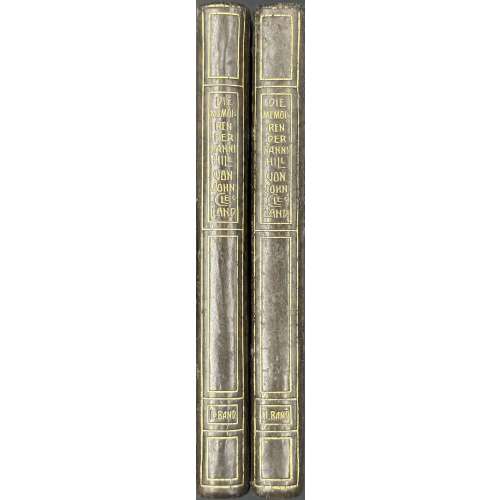 Two hardcover volumes, 17 x 11.5 cm, collated in-8vo, uniformly bound in dark grey mottled calf bordered with gilt fillet, flat spine with gilt lettering in compartments outlined in gilt; top edge gilt, text and plates printed on dense wove paper (Japanpapier). Privately printed by Gustav Röttig & Sohn (Ödenburg) in 800 copies, of which this is copy № 16, signed by von Bayros in 1st vol. Each volume is illustrated with four heliogravures (title-page and three plates) after drawings by Franz von Bayros. According to the seller, this is one of only 35 copies of the deluxe edition on Japanpapier, a fact which was mentioned by the bibliographers but not in the imprint. Bookplate to front pastedown in each volume, lettering to bottom “Ex libris Dr. phil. Rudolf Ludwig”, 120 x 100 mm, heliogravure after von Bayros. Pp.: vol. 1 [4] 1-198 plus engraved t.p. and 3 plates. Vol. 2: 1-204 [2] plus engraved t.p. and 3 plates. Title-page: DIE MEMOIREN | DER | FANNY HILL | VON | JOHN CLELAND | ESTER (ZWEITER) BAND | PAPHOS IM JAHR DER | CYTHERE | MDCCCCVI || Author of the text: John Cleland (British, c. 1709 – 1789). Translator: Franz Blei [Dr. Erich Feldhammer] (Austrian, 1871 – 1942). Illustrator: Franz von Bayros (Austrian, 1866 – 1924). Provenance: Dr. Phil. Rudolf Ludwig. Catalogue raisonné: The amorous drawings of the Marquis von Bayros. — New York: Cythera Press, 1968. The Beautiful Maiden of Pao, pp. 31-38. Seller's Description: Erster [und] Zweiter Band. Paphos [Wien, C. W. Stern], im Jahr der Cythere 1906. Mit sechs Tafeln und zwei illustrierten Titeln nach Franz von Bayros, alle zweifarbig. Grau marmorierte Originalkalblederbände mit Rücken-, Deckelkanten- und Kopfschnittvergoldung. Privatdruck. – Eins von 35 Exemplaren der Luxusausgabe auf Japanpapier, im Druckvermerk von Band I von Bayros signiert. – Die Übersetzung stammt von Franz Blei, der hier unter dem Pseudonym Dr. Erich Feldhammer genannt wird. Als Textvorlage diente die Ausgabe London 1749. – Gedruckt wurde bei Gustav Röttig & Sohn in Ödenburg. – Sehr seltene Vorzugsausgabe, die zwar bei den Bibliographen, nicht aber im Druckvermerk genannt wurde. – Fast tadellos. – »Dieses Werk ist eines der berühmtesten in der erotischen Literatur« (Stern-Szana). Nach Hinweis bei Brettschneider wurde die Auflage beschlagnahmt. – Exlibris Dr. phil. Rudolf Ludwig, Wien (Heliogravüre nach Zeichnung von Franz von Bayros, Brettschneider 156) in beiden Bänden. 17 : 11,5 cm. [4], 198, [2], [4], 204, [2] Seiten. Zusammen 8 Tafeln. Brettschneider 38. – Hayn/Gotendorf I, 618. – Stern-Szana 243 und ausführlich S. 222ff
Two hardcover volumes, 17 x 11.5 cm, collated in-8vo, uniformly bound in dark grey mottled calf bordered with gilt fillet, flat spine with gilt lettering in compartments outlined in gilt; top edge gilt, text and plates printed on dense wove paper (Japanpapier). Privately printed by Gustav Röttig & Sohn (Ödenburg) in 800 copies, of which this is copy № 16, signed by von Bayros in 1st vol. Each volume is illustrated with four heliogravures (title-page and three plates) after drawings by Franz von Bayros. According to the seller, this is one of only 35 copies of the deluxe edition on Japanpapier, a fact which was mentioned by the bibliographers but not in the imprint. Bookplate to front pastedown in each volume, lettering to bottom “Ex libris Dr. phil. Rudolf Ludwig”, 120 x 100 mm, heliogravure after von Bayros. Pp.: vol. 1 [4] 1-198 plus engraved t.p. and 3 plates. Vol. 2: 1-204 [2] plus engraved t.p. and 3 plates. Title-page: DIE MEMOIREN | DER | FANNY HILL | VON | JOHN CLELAND | ESTER (ZWEITER) BAND | PAPHOS IM JAHR DER | CYTHERE | MDCCCCVI || Author of the text: John Cleland (British, c. 1709 – 1789). Translator: Franz Blei [Dr. Erich Feldhammer] (Austrian, 1871 – 1942). Illustrator: Franz von Bayros (Austrian, 1866 – 1924). Provenance: Dr. Phil. Rudolf Ludwig. Catalogue raisonné: The amorous drawings of the Marquis von Bayros. — New York: Cythera Press, 1968. The Beautiful Maiden of Pao, pp. 31-38. Seller's Description: Erster [und] Zweiter Band. Paphos [Wien, C. W. Stern], im Jahr der Cythere 1906. Mit sechs Tafeln und zwei illustrierten Titeln nach Franz von Bayros, alle zweifarbig. Grau marmorierte Originalkalblederbände mit Rücken-, Deckelkanten- und Kopfschnittvergoldung. Privatdruck. – Eins von 35 Exemplaren der Luxusausgabe auf Japanpapier, im Druckvermerk von Band I von Bayros signiert. – Die Übersetzung stammt von Franz Blei, der hier unter dem Pseudonym Dr. Erich Feldhammer genannt wird. Als Textvorlage diente die Ausgabe London 1749. – Gedruckt wurde bei Gustav Röttig & Sohn in Ödenburg. – Sehr seltene Vorzugsausgabe, die zwar bei den Bibliographen, nicht aber im Druckvermerk genannt wurde. – Fast tadellos. – »Dieses Werk ist eines der berühmtesten in der erotischen Literatur« (Stern-Szana). Nach Hinweis bei Brettschneider wurde die Auflage beschlagnahmt. – Exlibris Dr. phil. Rudolf Ludwig, Wien (Heliogravüre nach Zeichnung von Franz von Bayros, Brettschneider 156) in beiden Bänden. 17 : 11,5 cm. [4], 198, [2], [4], 204, [2] Seiten. Zusammen 8 Tafeln. Brettschneider 38. – Hayn/Gotendorf I, 618. – Stern-Szana 243 und ausführlich S. 222ff -
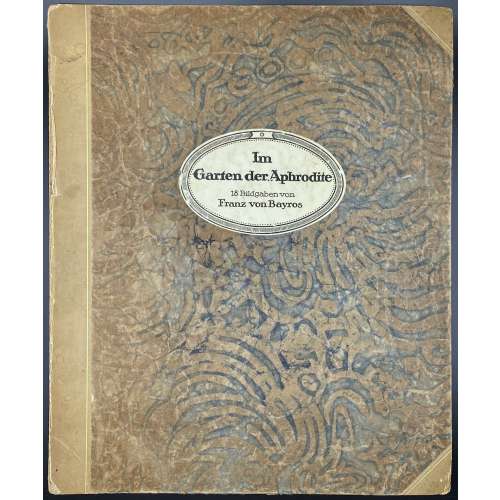 Cover with title: Im Garten der Aphrodite | 18 Bildgaben | von | Franz von Bayros | {vignette} | Privatdruck || in a frame; table of contents and limitation to verso; 18 plates with the drawings of Bayros in collotype reproduction, each mounted on cardboard and protected with the remnants of tissue guards, some lacking. Of the publisher’s folder, only the front board with an oval title label is present. Some images signed “Choisy le Conin” – von Bayros’s pseudonym. Two prints are missing: (1) Das Füßchen and (2) Die Liebesschaukel, the other 16 prints present. The vignette on the cover is a photomechanical reproduction. Edition: limited to 350 copies of which this is № 253. According to Christie’s: a collotype reprint, about twenty years after their first publication. English equivalent: The Garden of Aphrodite. Portfolio with 18 photogravures. Catalogue raisonné: The amorous drawings of the Marquis von Bayros (1968): pp. 177-1877; Bayros Zeichningen (1987): pp. 143-152.
Cover with title: Im Garten der Aphrodite | 18 Bildgaben | von | Franz von Bayros | {vignette} | Privatdruck || in a frame; table of contents and limitation to verso; 18 plates with the drawings of Bayros in collotype reproduction, each mounted on cardboard and protected with the remnants of tissue guards, some lacking. Of the publisher’s folder, only the front board with an oval title label is present. Some images signed “Choisy le Conin” – von Bayros’s pseudonym. Two prints are missing: (1) Das Füßchen and (2) Die Liebesschaukel, the other 16 prints present. The vignette on the cover is a photomechanical reproduction. Edition: limited to 350 copies of which this is № 253. According to Christie’s: a collotype reprint, about twenty years after their first publication. English equivalent: The Garden of Aphrodite. Portfolio with 18 photogravures. Catalogue raisonné: The amorous drawings of the Marquis von Bayros (1968): pp. 177-1877; Bayros Zeichningen (1987): pp. 143-152. -
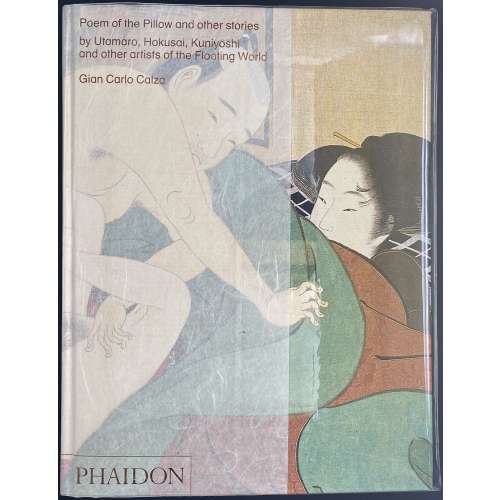 A pictorial album with almost no information (coffee-table book), hardcover, 28 x 21 x 4.8 cm, in pictorial paper boards, lettered all over, in transparent plastic dust jacket; pp.: [1-5] 6-463 [464 colophon], total 232 leaves, illustrated in colour throughout. Title-page: Poem of the Pillow and other stories | by Utamaro, Hokusai, Kuniyoshi | and other artists of the Floating World | Gian Carlo Calza | In collaboration with Stefania Piotti | {publisher’s device “Φ” in the bottom} || Contributors: Gian Carlo Calza (Italian, b. 1940); Stefania Piotti (Italian).
A pictorial album with almost no information (coffee-table book), hardcover, 28 x 21 x 4.8 cm, in pictorial paper boards, lettered all over, in transparent plastic dust jacket; pp.: [1-5] 6-463 [464 colophon], total 232 leaves, illustrated in colour throughout. Title-page: Poem of the Pillow and other stories | by Utamaro, Hokusai, Kuniyoshi | and other artists of the Floating World | Gian Carlo Calza | In collaboration with Stefania Piotti | {publisher’s device “Φ” in the bottom} || Contributors: Gian Carlo Calza (Italian, b. 1940); Stefania Piotti (Italian).
List of the artists: The Kanbun Master, Hishikawa Moronobu, Sugimura Jihei, Torii Kiyonobu I, Nishikawa Sukenobu, Miyagawa Chōshun, Okumura Masanobu, Tsukioka Settei, Suzuki Harunobu, Isoda Koryūsai, Katsukawa Shunshō, Katsukawa Shunchō, Kitao Masanobu, Torii Kiyonaga, Kitagawa Utamaro, Chōbunsai Eishi, Chōkyōsai Eiri, Katsushika Hokusai, Utagawa Toyokuni, Utagawa Kunisada, Kikugawa Eizan, Keisai Eisen, Utagawa Kuniyoshi."Poem of the Pillow and Other Stories examines the artistic developments of Japanese erotic art from the ukiyo-e period, dating from the mid-seventeenth century to the end of the nineteenth century. Known by the delicate euphemism of Shunga or 'spring images', these pictures were hugely popular and admired, and are today highly collectable works of art. This book illustrates major Shunga works from important ukiyo-e masters such as Utamaro, Hokusai, Harunobu, Kunisada, Kuniyoshi and many others. World-renowned scholar Gian Carlo Calza defines these fascinating erotic works in their social, historical and artistic context, providing a broad overview of a subject that is extremely nuanced and intriguing. Beautifully illustrated with over 300 images, including woodblock prints, scrolls and paintings, this book is a perfect introduction to ukiyo-e erotic art." -
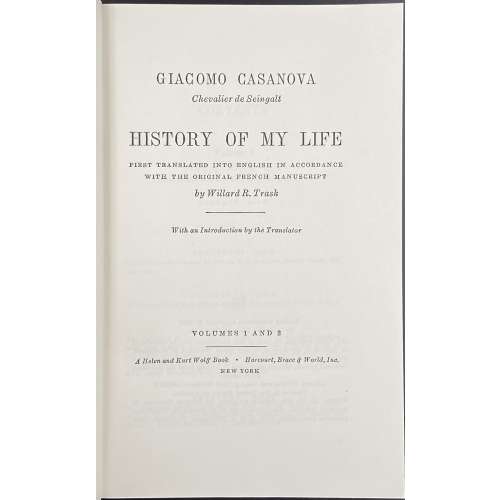 Title: GIACOMO CASANOVA | Chevalier de Seingalt | HISTORY OF MY LIFE | FIRST TRANSLATED INTO ENGLISH IN ACCORDANCE | WITH THE ORIGINAL FRENCH MANUSCRIPT | By Willard R. Trask | With an Introduction by the Translator | VOLUMES 1 AND 2 | A Helen and Kurt Wolff book • Harcourt, Brace & World, 1966 | NEW YORK || Stated 1st edition. Pagination: [2 blank] [i-iv] v-viii, [1, 2] 3-330 [8 blanks] + 32 ills. Two volumes in one.
Title: GIACOMO CASANOVA | Chevalier de Seingalt | HISTORY OF MY LIFE | FIRST TRANSLATED INTO ENGLISH IN ACCORDANCE | WITH THE ORIGINAL FRENCH MANUSCRIPT | By Willard R. Trask | With an Introduction by the Translator | VOLUMES 1 AND 2 | A Helen and Kurt Wolff book • Harcourt, Brace & World, 1966 | NEW YORK || Stated 1st edition. Pagination: [2 blank] [i-iv] v-viii, [1, 2] 3-330 [8 blanks] + 32 ills. Two volumes in one. -
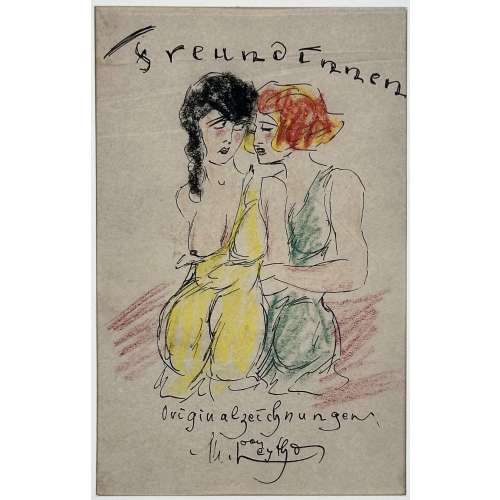 Seven pen and ink and colour crayon drawings on thin wove paper approx. 140 x 100 mm, each attached to a sheet 310 x 240 mm and mounted in a passepartout, placed in an aubergine cardboard folder 310 x 250 mm with a tan vellum spine and paper flaps inside; olive label with double border and gilt lettering to front cover "Dessins" [Drawings]. The first sheet is a title-page lettered in manuscript: Freundinnen | {vignette} | Originalzeichnungen | M. Leytho || [Girlfriends. Original drawings]. Information about the artist at www.honesterotica.com: "Mitja Leytho, almost certainly a pseudonym, is yet another mediocre yet fascinating amateur artist from the Germany of the 1920s about whom we know absolutely nothing beyond the four portfolios which bear the ‘Leytho’ signature". We shall notice that this set of drawings was produced by a talented professional, not an amateur.
Seven pen and ink and colour crayon drawings on thin wove paper approx. 140 x 100 mm, each attached to a sheet 310 x 240 mm and mounted in a passepartout, placed in an aubergine cardboard folder 310 x 250 mm with a tan vellum spine and paper flaps inside; olive label with double border and gilt lettering to front cover "Dessins" [Drawings]. The first sheet is a title-page lettered in manuscript: Freundinnen | {vignette} | Originalzeichnungen | M. Leytho || [Girlfriends. Original drawings]. Information about the artist at www.honesterotica.com: "Mitja Leytho, almost certainly a pseudonym, is yet another mediocre yet fascinating amateur artist from the Germany of the 1920s about whom we know absolutely nothing beyond the four portfolios which bear the ‘Leytho’ signature". We shall notice that this set of drawings was produced by a talented professional, not an amateur. -
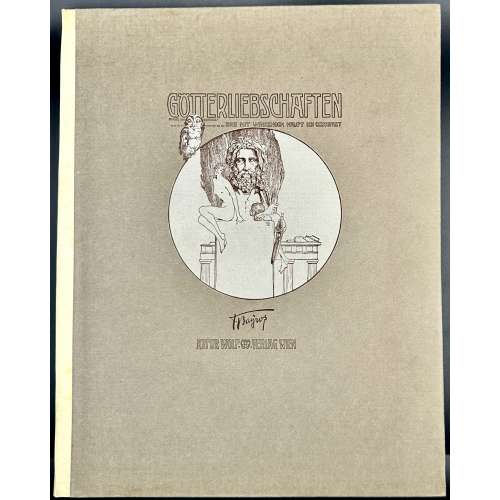 Letterpress title-page, engraved title-page, and 10 sheets of collotype plates printed on india paper mounted on thick wove paper, with captioned guard sheets, loose in a vellum-backed cardboard portfolio with cloth-mounted flaps; floral diaper design inside throughout; bookseller's label to front board verso; limited edition of 550 copies of which this is copy № 103. Dimensions: 338 x 268 mm portfolio; 325 x 260 mm sheet, 225 x 195 mm image. Front board with lettering and vignette: GÖTTERLIEBSCHAFTEN | DAS MIT WINKENDEM HAUPT ICH GEWAHRET | {vignette} | {signature} | ARTUR WOLF / VERLAG WIEN || Letterpress title-page: FRANZ VON BAYROS | “GÖTTERLIEBSCHAFTEN” | ARTUR WOLF / VERLAG WIEN | 1914 || Verso to letterpress t.p. VERZEICHNIS DER TAFELN.
Letterpress title-page, engraved title-page, and 10 sheets of collotype plates printed on india paper mounted on thick wove paper, with captioned guard sheets, loose in a vellum-backed cardboard portfolio with cloth-mounted flaps; floral diaper design inside throughout; bookseller's label to front board verso; limited edition of 550 copies of which this is copy № 103. Dimensions: 338 x 268 mm portfolio; 325 x 260 mm sheet, 225 x 195 mm image. Front board with lettering and vignette: GÖTTERLIEBSCHAFTEN | DAS MIT WINKENDEM HAUPT ICH GEWAHRET | {vignette} | {signature} | ARTUR WOLF / VERLAG WIEN || Letterpress title-page: FRANZ VON BAYROS | “GÖTTERLIEBSCHAFTEN” | ARTUR WOLF / VERLAG WIEN | 1914 || Verso to letterpress t.p. VERZEICHNIS DER TAFELN.- Europa und der Stier
- Leda und die Schildkröte
- Sterope und Herkules
- Herodikos und die Turnerinnen
- Phoroneus und die Hirtin
- Minos und Persipeia
- Phryne und Mutter
- Pytalos und Demeter
- Kirke und die Ferkel
- Putiphar
-
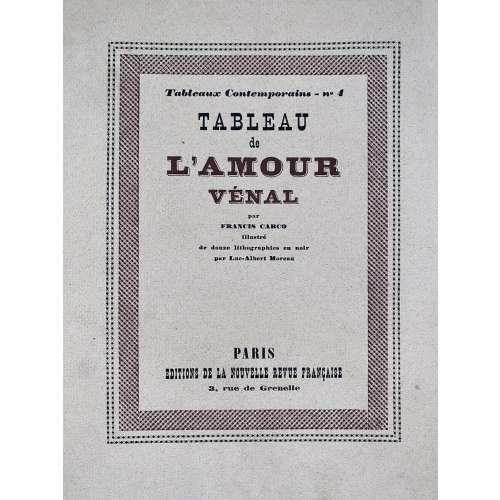 Description: Softcover, French flapped wrappers, lettered front, back (advert.) and spine, collated in-4to, 24.3 x 20.2 cm, printed on thick wove paper Vélin pur fil Lafuma-Navarre, print run limited to 335 copies from which this is copy № 219; outer margin untrimmed, some leaves uncut, glassine DJ. Limitation: 1 copy (A) on Japon Impérial + double suite of plates + suite of original drawings, 4 copies (B-E) on Japon Impérial + double suite of plates, 15 copies on on Japon Impérial + suite of plates on Vieux Japon teinté (F-T), 315 copies on Vélin pur fil Lafuma-Navarre, of which 15 (I-XV) not for sale. Copyright: Libraire Gallimard, 1924. Printed: March 10, 1924 – text by Coulouma (Argenteuil) under direction of H. Barthélemy, lithographs printed by Marchizet (Paris). Front wrapper (in letterpress two-colour border): Tableaux Contemporains – no 4 | . TABLEAU | de | L'AMOUR | VÉNAL | par | FRANCIS CARCO | Illustré | de douze lithographies en noir | par Luc-Albert Moreau | PARIS | ÉDITIONS DE LA NOUVELLE REVUE FRANÇAISE | 3, rue de Grenelle || Title-page: Same, without a frame, in black, L'AMOUR | VÉNAL in brown. Collation: 4to; 14 a4 2-164, total 68 leaves with wrappers included in collation plus 12 plates, incl. frontispiece, extraneous to collation. Pagination: [2 wrapper] [6] [i] ii-vii [viii blank] [9] 10-122 [2 colophon] [2 blank] [2 wrapper]; total 136 pages incl. wrappers, plus ils. Contributors: Francis Carco [François Carcopino-Tusoli] (French, 1886 – 1958) – author. Luc-Albert Moreau (French, 1882 – 1948) – artist. La Nouvelle Revue Française (nrf) (Paris)– publisher. Gaston Gallimard (French, 1881 – 1975) – publisher.
Description: Softcover, French flapped wrappers, lettered front, back (advert.) and spine, collated in-4to, 24.3 x 20.2 cm, printed on thick wove paper Vélin pur fil Lafuma-Navarre, print run limited to 335 copies from which this is copy № 219; outer margin untrimmed, some leaves uncut, glassine DJ. Limitation: 1 copy (A) on Japon Impérial + double suite of plates + suite of original drawings, 4 copies (B-E) on Japon Impérial + double suite of plates, 15 copies on on Japon Impérial + suite of plates on Vieux Japon teinté (F-T), 315 copies on Vélin pur fil Lafuma-Navarre, of which 15 (I-XV) not for sale. Copyright: Libraire Gallimard, 1924. Printed: March 10, 1924 – text by Coulouma (Argenteuil) under direction of H. Barthélemy, lithographs printed by Marchizet (Paris). Front wrapper (in letterpress two-colour border): Tableaux Contemporains – no 4 | . TABLEAU | de | L'AMOUR | VÉNAL | par | FRANCIS CARCO | Illustré | de douze lithographies en noir | par Luc-Albert Moreau | PARIS | ÉDITIONS DE LA NOUVELLE REVUE FRANÇAISE | 3, rue de Grenelle || Title-page: Same, without a frame, in black, L'AMOUR | VÉNAL in brown. Collation: 4to; 14 a4 2-164, total 68 leaves with wrappers included in collation plus 12 plates, incl. frontispiece, extraneous to collation. Pagination: [2 wrapper] [6] [i] ii-vii [viii blank] [9] 10-122 [2 colophon] [2 blank] [2 wrapper]; total 136 pages incl. wrappers, plus ils. Contributors: Francis Carco [François Carcopino-Tusoli] (French, 1886 – 1958) – author. Luc-Albert Moreau (French, 1882 – 1948) – artist. La Nouvelle Revue Française (nrf) (Paris)– publisher. Gaston Gallimard (French, 1881 – 1975) – publisher. -
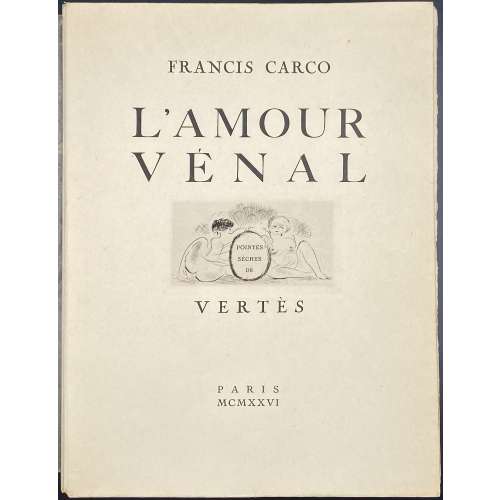 Description: One volume, publisher’s original tan French flapped wrappers with engraved vignette, in glassine DJ, unbound, 25.5 x 19.5 cm, collated in-4to, bottom and outer margins untrimmed, some pages uncut, printed on laid watermarked Van Gelder Zonen paper, illustrated with 15 full-page drypoint plates, some with tissue guard; front wrapper, t.p. and table vignettes, numerous head- and tailpieces by R. Lacourière after drawings by Marcel Vertès, enriched with two cancelled images printed on different laid papers in different states, three of each image. Printed on June 10, 1926 by Coulouma (Argenteuil) under the direction of H. Barthélemy, drypoints by Roger Lacourière (Paris). Limitation: 95 copies of which № 1 on Japon Ancien, № № 2-26 on Japon Impérial, and №№ 27-95 on Hollande. This is copy № 78. Front wrapper: FRANCIS CARCO | L'AMOUR | VÉNAL | {vignette with inscription in oval tablet «POINTES | SÈCHES | DE» } | VERTÈS | PARIS | MCMXXVI || Title-page: FRANCIS CARCO | L'AMOUR | VÉNAL | {vignette} | POINTES SÈCHES DE | VERTÈS | PARIS | MCMXXVI || Collation: 2 leaves in wrapper, π4 (fac-simile of Carco a.l.s., h.t., t.p., authorship) a4 (preface), 1-164 [17]4, 2 leaves in wrapper; total without the wrapper 76 leaves plus 15 plates, plus 6 plates of enrichment plates. Pagination: [8] [i] [ii-viii] [1] 2-128 [8], total 152 pages, ils. Note: The edition is not in Dutel, not in Pia (Enfer); Fekete (2014): № 215, p. 117; Vokaer (1967): № 15, p.10. According to both sources, it is a 2-volume edition, with text in vol. 1 and plates in vol. 2. Vokaer attributes publishing to La Roseraie (Paris) and provides for 45 drypoints of which 18 full-page plates in the second volume. Fekete (Christie’s) provides for 15 full-page plates and 25 illustrations in text. Contributors: Francis Carco [François Carcopino-Tusoli] (French, 1886 – 1958) – author. Marcel Vertès [Marcell Vértes] (Jewish-Hungarian-French, 1895 – 1961) – artist. Roger Lacourière (French, 1892 – 1966) – engraver, printer.
Description: One volume, publisher’s original tan French flapped wrappers with engraved vignette, in glassine DJ, unbound, 25.5 x 19.5 cm, collated in-4to, bottom and outer margins untrimmed, some pages uncut, printed on laid watermarked Van Gelder Zonen paper, illustrated with 15 full-page drypoint plates, some with tissue guard; front wrapper, t.p. and table vignettes, numerous head- and tailpieces by R. Lacourière after drawings by Marcel Vertès, enriched with two cancelled images printed on different laid papers in different states, three of each image. Printed on June 10, 1926 by Coulouma (Argenteuil) under the direction of H. Barthélemy, drypoints by Roger Lacourière (Paris). Limitation: 95 copies of which № 1 on Japon Ancien, № № 2-26 on Japon Impérial, and №№ 27-95 on Hollande. This is copy № 78. Front wrapper: FRANCIS CARCO | L'AMOUR | VÉNAL | {vignette with inscription in oval tablet «POINTES | SÈCHES | DE» } | VERTÈS | PARIS | MCMXXVI || Title-page: FRANCIS CARCO | L'AMOUR | VÉNAL | {vignette} | POINTES SÈCHES DE | VERTÈS | PARIS | MCMXXVI || Collation: 2 leaves in wrapper, π4 (fac-simile of Carco a.l.s., h.t., t.p., authorship) a4 (preface), 1-164 [17]4, 2 leaves in wrapper; total without the wrapper 76 leaves plus 15 plates, plus 6 plates of enrichment plates. Pagination: [8] [i] [ii-viii] [1] 2-128 [8], total 152 pages, ils. Note: The edition is not in Dutel, not in Pia (Enfer); Fekete (2014): № 215, p. 117; Vokaer (1967): № 15, p.10. According to both sources, it is a 2-volume edition, with text in vol. 1 and plates in vol. 2. Vokaer attributes publishing to La Roseraie (Paris) and provides for 45 drypoints of which 18 full-page plates in the second volume. Fekete (Christie’s) provides for 15 full-page plates and 25 illustrations in text. Contributors: Francis Carco [François Carcopino-Tusoli] (French, 1886 – 1958) – author. Marcel Vertès [Marcell Vértes] (Jewish-Hungarian-French, 1895 – 1961) – artist. Roger Lacourière (French, 1892 – 1966) – engraver, printer. -
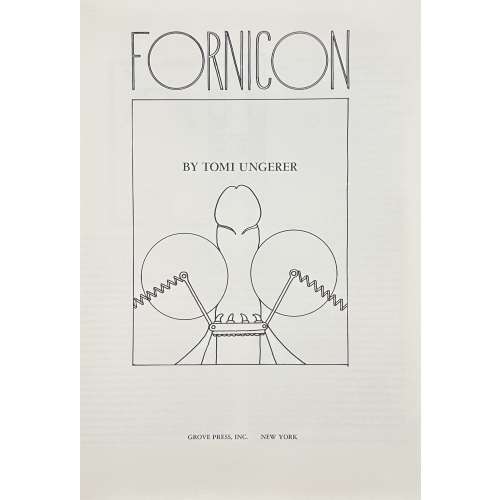 Hardcover, 333 x 247 mm, black cloth with gilt facsimile to front board and gilt lettering to spine, aubergine dust jacket with white lettering and red facsimile over black panel to front and back, crimson endpapers, laid paper, unpaginated; pp.: [4] h.t./blank, t.p./imprint, [2] text by John Hollander, 61 leaves of plates; originally published in 1969 by Rhinoceros Press, New York, as a limited-edition portfolio with slipcase. Title-page: Fornicon | (in frame) BY TOMI UNGERER | GROVE PRESS NEW YORK || Jean-Thomas [Tomi] Ungerer (French,1931 – 2019) John Hollander (American, 1929 – 2013)
Hardcover, 333 x 247 mm, black cloth with gilt facsimile to front board and gilt lettering to spine, aubergine dust jacket with white lettering and red facsimile over black panel to front and back, crimson endpapers, laid paper, unpaginated; pp.: [4] h.t./blank, t.p./imprint, [2] text by John Hollander, 61 leaves of plates; originally published in 1969 by Rhinoceros Press, New York, as a limited-edition portfolio with slipcase. Title-page: Fornicon | (in frame) BY TOMI UNGERER | GROVE PRESS NEW YORK || Jean-Thomas [Tomi] Ungerer (French,1931 – 2019) John Hollander (American, 1929 – 2013) -
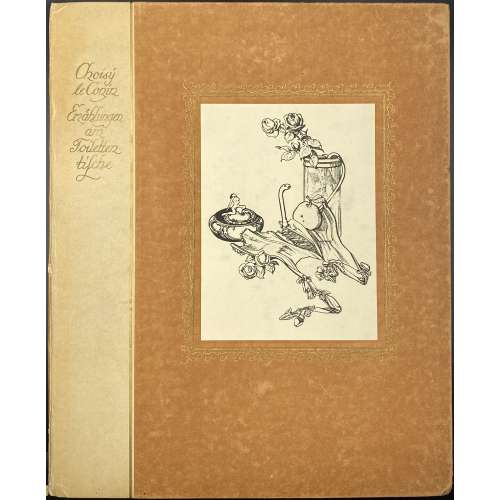 Publisher's flapped portfolio 32.8 x 26.8 cm, gilt-ruled and gilt-lettered quarter faux-parchment waxed paper over brown paper boards with pasted illustration after von Bayros within gilt arabesque frame. Possibly published in Vienna by Heinrich Conrad in 1905 or 1908. The portfolio contains the title page with a vignette and 15 loose wove paper sheets 32 x 26.2 cm of collotype reproductions after drawings by Franz von Bayros. Cover gilt lettering: Choisÿ | le Conin | Erzählungen | am | Toiletten- | tische || Title-page: Erzählungen | am Toilettentische | von | CHOISY LE CONIN | {vignette} || Title-page verso: Inhalt: | 1. Die Tabaksdose | 2. Viola de Gamba | 3. Der Bote | 4. Nicht drängeln, Kinder! | 5. Die blaue Feder | 6. O what a pretty like-place! | 7. Die Sonnenuhr |8. Der Temel der der Cotÿs | 9. Der Fetischist | 10. Jupiter und Europa | 11. Die Witwe | 12. Paroxÿsme-erotique | 13. Der Rivale | 14. Die rote Lehrerin | 15. Tantalus | Nicht im Handel. || Catalogue raisonné: The amorous drawings of the Marquis von Bayros / Part I and II. — NY: Cythera Press, 1968; pp. 95-111 [LIB-2246.2019]
Publisher's flapped portfolio 32.8 x 26.8 cm, gilt-ruled and gilt-lettered quarter faux-parchment waxed paper over brown paper boards with pasted illustration after von Bayros within gilt arabesque frame. Possibly published in Vienna by Heinrich Conrad in 1905 or 1908. The portfolio contains the title page with a vignette and 15 loose wove paper sheets 32 x 26.2 cm of collotype reproductions after drawings by Franz von Bayros. Cover gilt lettering: Choisÿ | le Conin | Erzählungen | am | Toiletten- | tische || Title-page: Erzählungen | am Toilettentische | von | CHOISY LE CONIN | {vignette} || Title-page verso: Inhalt: | 1. Die Tabaksdose | 2. Viola de Gamba | 3. Der Bote | 4. Nicht drängeln, Kinder! | 5. Die blaue Feder | 6. O what a pretty like-place! | 7. Die Sonnenuhr |8. Der Temel der der Cotÿs | 9. Der Fetischist | 10. Jupiter und Europa | 11. Die Witwe | 12. Paroxÿsme-erotique | 13. Der Rivale | 14. Die rote Lehrerin | 15. Tantalus | Nicht im Handel. || Catalogue raisonné: The amorous drawings of the Marquis von Bayros / Part I and II. — NY: Cythera Press, 1968; pp. 95-111 [LIB-2246.2019] -
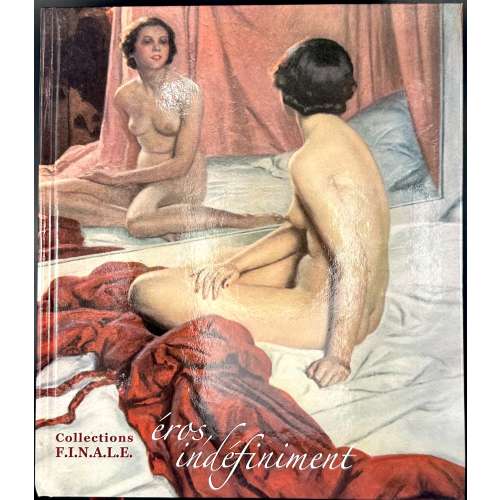 NEWHardcover volume, 297 x 256 x 40 mm, glossy pictorial boards, pp. [1-8] 9-428 [4], profusely illustrated, text in French. F.I.N.A.L.E. stands for Foundation Internationale d’Arts et Litératures Érotiques (Foundation of Erotic Arts and Literatures, established on December 12, 1996 in Lausanne, Switzerland. Title-page: éros, | indéfiniment | Collections F.I.N.A.L.E. | { HumuS, publisher’s device} ||
NEWHardcover volume, 297 x 256 x 40 mm, glossy pictorial boards, pp. [1-8] 9-428 [4], profusely illustrated, text in French. F.I.N.A.L.E. stands for Foundation Internationale d’Arts et Litératures Érotiques (Foundation of Erotic Arts and Literatures, established on December 12, 1996 in Lausanne, Switzerland. Title-page: éros, | indéfiniment | Collections F.I.N.A.L.E. | { HumuS, publisher’s device} || -
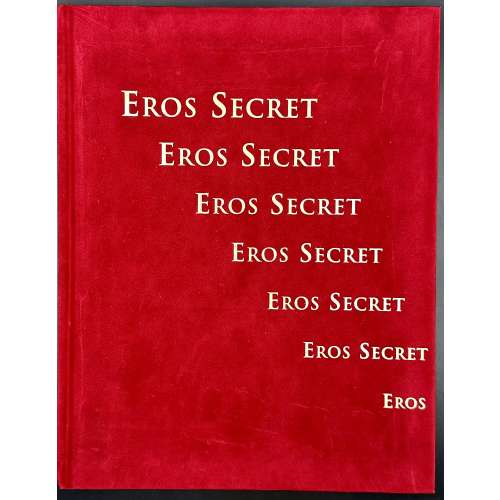 NEWHardcover volume, 290 x 225 mm, bound in scarlet velveteen with gilt lettering to front and spine, gilt vignette and lettering to back; pp.: [1-8] 9-204 [4], profusely illustrated; text in French and English. ISBN : 2-940127-37-9. Title-page (yellow on red paper): EROS SECRET | OBJETS EROTIQUES A TRANSFORMATION | EROTIC TRANSFORMATION OBJECTS | Photographies et chorégraphie : Véronique Willemin | Photographer and choreography || “The ensemble of 150 objects presented belongs to one single collector. The manner in which the author met him at the airport of Larnaca, then on a yacht in the Mediterranean sea, resembles more a novel by Gérard de Villiers than the preface of a curator but has its own touch of spice” [Art of the day Weekly].
NEWHardcover volume, 290 x 225 mm, bound in scarlet velveteen with gilt lettering to front and spine, gilt vignette and lettering to back; pp.: [1-8] 9-204 [4], profusely illustrated; text in French and English. ISBN : 2-940127-37-9. Title-page (yellow on red paper): EROS SECRET | OBJETS EROTIQUES A TRANSFORMATION | EROTIC TRANSFORMATION OBJECTS | Photographies et chorégraphie : Véronique Willemin | Photographer and choreography || “The ensemble of 150 objects presented belongs to one single collector. The manner in which the author met him at the airport of Larnaca, then on a yacht in the Mediterranean sea, resembles more a novel by Gérard de Villiers than the preface of a curator but has its own touch of spice” [Art of the day Weekly]. -
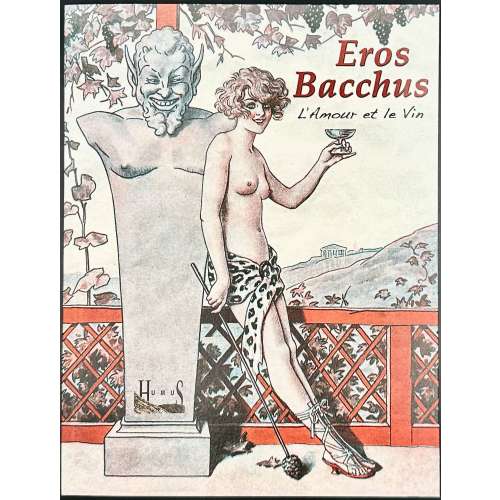 NEWBound in full-colour pictorial wrappers with French flaps, 250 x 190 x 35 mm, 1,311 g by weight, profusely illustrated volume, pp. [1-4] 5-427 [5], 216 leaves total. Title-page: {vignette} | EROS BACCHUS | L'amour et le vin | {publisher's device} || Exhibition at Château Musée du vin et de la vigne, à Aigle, du 24 mai 2014 au 28 février 2015. Text by Michel Froidevaux. Original description : Depuis l'apparition du vignoble, l'amour et le vin sont inséparables. Tantôt boisson des dieux, tantôt breuvage des poètes, le vin a la vertu de rapprocher les êtres. De la riche mythologie antique - Dionysos et Bacchus - aux fêtes des confréries contemporaines, le vin enflamme l'imaginaire et génère de la convivialité. L'idée est de proposer un parcours ludique et culturel, badin et savant pour aller par siècles et contrées à la découverte des plaisirs du boire et des méandres du désir. Livre richement illustré d'un millier d'images (dessins, objets, cartes postales,...) avec la participation d'une quarantaine d'artistes contemporains qui ont créé spécialement une œuvre. Machine translation: Love and wine have been inseparable since the dawn of the vineyard. Sometimes the drink of the gods, sometimes the beverage of poets, wine has the virtue of bringing people together. From the rich mythology of antiquity - Dionysus and Bacchus - to contemporary brotherhood celebrations, wine fires the imagination and generates conviviality. The idea is to offer a playful and cultural journey, both playful and learned, through centuries and lands, to discover the pleasures of drinking and the twists and turns of desire. The book is richly illustrated with some 1,000 images (drawings, objects, postcards, etc.), featuring works by some 40 contemporary artists.
NEWBound in full-colour pictorial wrappers with French flaps, 250 x 190 x 35 mm, 1,311 g by weight, profusely illustrated volume, pp. [1-4] 5-427 [5], 216 leaves total. Title-page: {vignette} | EROS BACCHUS | L'amour et le vin | {publisher's device} || Exhibition at Château Musée du vin et de la vigne, à Aigle, du 24 mai 2014 au 28 février 2015. Text by Michel Froidevaux. Original description : Depuis l'apparition du vignoble, l'amour et le vin sont inséparables. Tantôt boisson des dieux, tantôt breuvage des poètes, le vin a la vertu de rapprocher les êtres. De la riche mythologie antique - Dionysos et Bacchus - aux fêtes des confréries contemporaines, le vin enflamme l'imaginaire et génère de la convivialité. L'idée est de proposer un parcours ludique et culturel, badin et savant pour aller par siècles et contrées à la découverte des plaisirs du boire et des méandres du désir. Livre richement illustré d'un millier d'images (dessins, objets, cartes postales,...) avec la participation d'une quarantaine d'artistes contemporains qui ont créé spécialement une œuvre. Machine translation: Love and wine have been inseparable since the dawn of the vineyard. Sometimes the drink of the gods, sometimes the beverage of poets, wine has the virtue of bringing people together. From the rich mythology of antiquity - Dionysus and Bacchus - to contemporary brotherhood celebrations, wine fires the imagination and generates conviviality. The idea is to offer a playful and cultural journey, both playful and learned, through centuries and lands, to discover the pleasures of drinking and the twists and turns of desire. The book is richly illustrated with some 1,000 images (drawings, objects, postcards, etc.), featuring works by some 40 contemporary artists.


